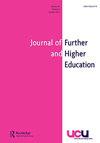大学生情绪智力与焦虑:曲线关系的证据
IF 2.4
Q1 EDUCATION & EDUCATIONAL RESEARCH
引用次数: 0
摘要
情绪智力,即感知、解释和调节情绪的能力,与许多适应性结果有关。然而,最近的研究表明,情绪智力可以对动机、人际和情感因素产生非线性影响。尽管过去的工作已经提供了最佳情商水平的证据,但许多研究都依赖于统计程序,当用于调查曲线关系时,这些程序容易出现推断错误。因此,本研究旨在利用一种旨在检测变量之间曲线关系的推理方法,检验情绪智力与广泛性焦虑之间是否存在非线性关联。大学生(N = 345;68.79%的白人,86.99%的女性,X′′年龄= 26.11)完成了简易情绪智力量表和Zung焦虑自评量表。通过分段回归分析,我们确定情绪智力与焦虑之间的关系遵循非线性趋势。具体来说,我们的研究结果表明,在情商“低”和“高”的人群中,情商与焦虑呈正相关。此外,我们的研究结果还显示,在情商“中等”的人群中,情商和焦虑呈负相关。我们认为,当前的研究对支持大学生情感成长和学业成功的努力具有重要意义。本文章由计算机程序翻译,如有差异,请以英文原文为准。
Emotional intelligence and anxiety in university students: evidence of a curvilinear relationship
ABSTRACT Emotional intelligence, or the ability to perceive, interpret, and regulate emotions, has been linked to numerous adaptive outcomes. However, recent investigations have demonstrated that emotional intelligence can exert a nonlinear impact on motivational, interpersonal, and affective factors. Although past work has provided evidence of optimal levels of emotional intelligence, many studies have relied on statistical procedures that are prone to inferential errors when used to investigate curvilinear relationships. Thus, the current study was designed to test for the presence of a nonlinear association between emotional intelligence and generalized anxiety using an inferential method designed to detect curvilinear relationships between variables. University students (N = 345; 68.79% Caucasian, 86.99% female, X ̅Age = 26.11) completed the Brief Emotional Intelligence Scale and Zung Self-Rating Anxiety Scale. Using segmented regression analysis, we determined that the relationship between emotional intelligence and anxiety follows a nonlinear trend. Specifically, our results indicate that emotional intelligence is positively related to anxiety among those with ‘low’ and ‘high’ levels of emotional intelligence. Additionally, our findings revealed emotional intelligence and anxiety were negatively related among those with ‘moderate’ levels of emotional intelligence. We believe the current work has important implications for efforts designed to support university students’ emotional growth and academic success.
求助全文
通过发布文献求助,成功后即可免费获取论文全文。
去求助
来源期刊

JOURNAL OF FURTHER AND HIGHER EDUCATION
EDUCATION & EDUCATIONAL RESEARCH-
CiteScore
5.20
自引率
4.30%
发文量
80
期刊介绍:
Journal of Further and Higher Education is an international, peer-reviewed journal publishing scholarly work that represents the whole field of post-16 education and training. The journal engages with a diverse range of topics within the field including management and administration, teacher education and training, curriculum, staff and institutional development, and teaching and learning strategies and processes. Through encouraging engagement with and around policy, contemporary pedagogic issues and professional concerns within different educational systems around the globe, Journal of Further and Higher Education is committed to promoting excellence by providing a forum for scholarly debate and evaluation. Articles that are accepted for publication probe and offer original insights in an accessible, succinct style, and debate and critique practice, research, theory. They offer informed perspectives on contextual and professional matters and critically examine the relationship between theory and practice across the spectrum of further and higher education.
 求助内容:
求助内容: 应助结果提醒方式:
应助结果提醒方式:


